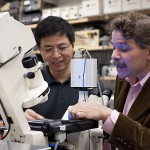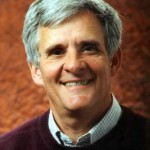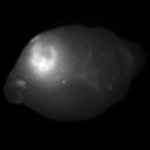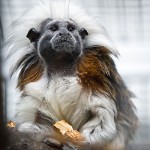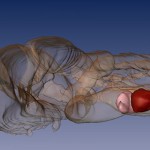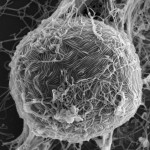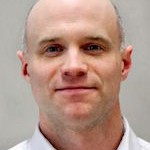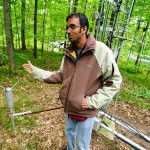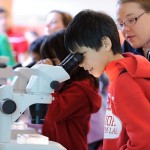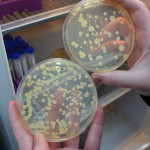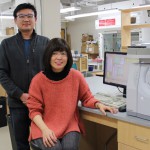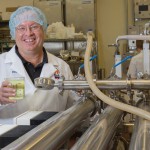Tag Research
Plowing prairies for grains: Biofuel crops replace grasslands nationwide
Clearing grasslands to make way for biofuels may seem counterproductive, but University of Wisconsin–Madison researchers show in a study today (April 2, 2015) that crops, including the corn and soy commonly used for biofuels, expanded onto 7 million acres of new land in the U.S. over a recent four-year period, replacing millions of acres of grasslands. Read More
Mailick to Lead UW–Madison Research, Graduate Education
Marsha Mailick, the former long-time director of the University of Wisconsin–Madison's Waisman Center, was named today by Chancellor Rebecca Blank as the university's first vice chancellor for research and graduate education. Read More
Ready, aim, fire! Cancer-targeting mechanism underlies promising UW–Madison spinoff
For all their lethality, cancer cells don't look much different from healthy cells, a simple fact that causes endless pain and suffering. Finding cancer cells that have spread and threaten to grow into metastatic tumors is often a life-and-death matter. Read More
Hormone known for mother’s milk also fosters bond between parents
Research has discovered a role for prolactin, the hormone that stimulates milk production in nursing mothers, in the bond between parents. Read More
UW-Madison cancer research showcased in Wisconsin Public Television series
Next week, cancer research by University of Wisconsin–Madison scientists will be featured in a series of programs airing on Wisconsin Public Television (WPT). Read More
Researchers aim to broaden understanding of how toxins affect the body
Even in an era in which there is increased emphasis on living "green," humans are constantly exposed to a wide range of toxins in everything from our air, food and water to the goods we buy. Read More
Automation offers big solution to big data in astronomy
It’s almost a rite of passage in physics and astronomy. Scientists spend years scrounging up money to build a fantastic new instrument. Then, when the long-awaited device finally approaches completion, the panic begins: How will they handle the torrent of data? Read More
Discovery could yield more efficient portable electronics, solar cells
By figuring out how to precisely order the molecules that make up what scientists call organic glass — the materials at the heart of some electronic displays, light-emitting diodes and solar cells — a team of chemists from the University of Wisconsin–Madison has set the stage for more efficient and sturdier portable electronic devices and possibly a new generation of solar cells based on organic materials. Read More
UW mascot Bucky Badger is namesake for newly discovered yeast
When you discover a new organism, you get to name it - but not for yourself. There are rules to the naming business in biology. You can, however, name it for the sponsor of your research. When Chris Hittinger and his group of yeast researchers at the University of Wisconsin–Madison found a rather aggressive yeast, it was natural to name it for the fierce carnivore that is the mascot of his home institution: Bucky Badger. Read More
Researchers develop new approach that combines biomass conversion, solar energy conversion
In a study published March 9 in Nature Chemistry, University of Wisconsin–Madison chemistry Professor Kyoung-Shin Choi presents a new approach to combine solar energy conversion and biomass conversion, two important research areas for renewable energy. Read More
Move over Mozart: Study shows cats prefer their own beat
As more animal shelters, primate centers and zoos start to play music for their charges, it’s still not clear whether and how human music affects animals. Now, a study from the University of Wisconsin–Madison shows that while cats ignore our music, they are highly responsive to “music” written especially for them. The study is online at Applied Animal Behaviour Science. Read More
Center for Dairy Research turns yogurt waste into new products
With exploding consumer demand for Greek yogurt, production is up. That's great for food companies' bottom lines, but it also leaves them dealing with a lot more acid whey, a problematic byproduct of the Greek yogurt-making process. Read More
Search narrows for UW–Madison research leader
Four finalists have been named for the University of Wisconsin–Madison’s top research and graduate education post. Read More

